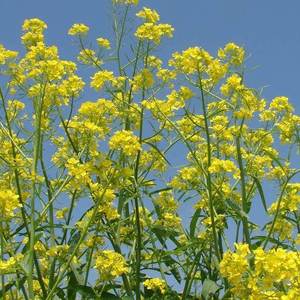Carinata seed distribution agreement discussions underway

Photo: University of Florida Extension
February 8, 2018
BY Agrisoma Biosciences Inc.
Agrisoma Biosciences Inc. and Nuseed confirm they are in discussions to develop a distribution agreement for carinata seed. This announcement follows the world’s first transpacific Qantas Airways flight powered by biojet fuel made from carinata developed by Agrisoma. Both events signal the beginning of an exciting new market for Australian growers.
“Qantas’ partnership with Agrisoma marks a big step in the development of a renewable jet fuel industry in Australia,” said Alison Webster, Qantas International CEO. “It is a project we are really proud to be part of as we look at ways to reduce carbon emissions across our operations.”
This year Agrisoma’s second phase of carinata research and development is set to optimize the crop’s agronomic performance, and precommercial activities are anticipated as early as 2019.
Carinata, a type of nonfood-grade mustard seed, has numerous benefits for Australian growers. It is a resilient crop that increases productivity of marginal land. Carinata is water- and input-efficient, and it performs well at decreasing erosion, conserving nutrients and improving soil health. Carinata meal is feed quality and high in protein, and its production uses the same equipment and agronomic knowledge as canola and wheat production.
Advertisement
“Carinata is grown and harvested much like canola,” said Agrisoma CEO Steve Fabijanski. “With Nuseed we have a seed distribution partner with agronomic knowledge, connection and commitment to Australian growers, plus expertise in production from grower to processor. Nuseed is the canola leader and an ideal distribution partner in Australia. They also have a global presence in other key regions.”
The Agrisoma carinata distribution letter of intent complements Nuseed’s own research and development programs for its three core crops. “Plant traits have amazing potential to address many critical issues like improved nutrition, sustainability and energy,” said Brent Javra, Nuseed global business leader. “We are working globally to realize this potential through strategic partnerships and our own canola, sorghum and sunflower R&D programs.”
Advertisement
Related Stories
Broco Energy on July 17 announced a new partnership with the Massachusetts Port Authority (Massport) to deliver and transition Massport's fuel tanks to renewable diesel across its various facilities.
Shell Aviation, Accenture, and Amex GBT on July 10 announced Avelia is in the process of evolving to an industry solution with independent data hosting and a multi-supplier model helping users access the GHG benefits of SAF.
Avia Solutions Group, the world's largest ACMI (aircraft, crew, maintenance, and insurance) provider, has partnered with DHL Express to reduce greenhouse gas emissions from its international shipments using SAF.
Bangkok Airways Public Company Limited has officially announced the adoption of sustainable aviation fuel (SAF) on its commercial flights, reinforcing Thailand’s green aviation industry. The initiative took effect starting July 1, 2025.
The USDA significantly increased its estimate for 2025-’26 soybean oil use in biofuel production in its latest World Agricultural Supply and Demand Estimates report, released July 11. The outlook for soybean production was revised down.
Upcoming Events










